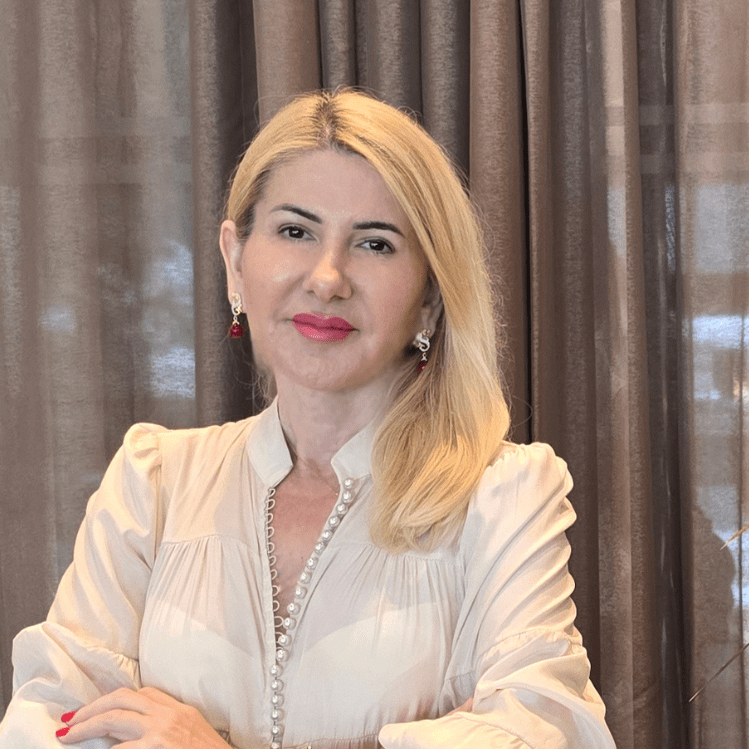
From Fear to Freedom: Personal Transformation through Hypnotherapy
Hello, I’m Maria Motea, a clinical hypnotherapist (RTT) and spiritual coach specialising in helping individuals overcome emotional traumas, addictions, panic attacks, and stress through transformative hypnotherapy sessions. With 22 years on the beautiful island of Cyprus and a background in hypnotherapy and cognitive techniques for stress management in business, my journey began with a lifelong fascination with the supernatural and inner world. At 45, I faced a transformative period of self-discovery, overcoming paralysing fears to heal childhood traumas and unlock my potential. For the past three years, I’ve passionately supported clients both online and in person, guiding them towards profound healing and growth.
Can you share a specific example of how hypnotherapy has helped a client overcome a challenge or trauma in their life?
Here’s an example.
A client, who had suffered narcissistic abuse for 18 years, came to me feeling fearful, helpless, and deeply hurt. The abuse had led to her developing PTSD and losing her confidence and self-esteem. Her husband had verbally abused her, constantly belittling her and making her feel worthless.
When I asked her to look in the mirror, she said, “I see an old, ugly woman.” But what I saw was a very attractive 39-year-old mother of two children who has lost all her self-esteem and confidence in herself.
The truth is, being married to a narcissist for 18 years made her believe the words of her husband more than she believed her own eyes. She endured verbal abuse during her 18-year marriage. He called her all the bad names he could come up with. It became so normal in the house that even one of her children started to treat her the same way. She mustered the courage to end the relationship, but her husband felt challenged by her decision and did everything to regret it. She faced various forms of threats, stalking, and bullying. Years of abuse forced her to believe the narcissist’s words. She knew she needed help to build her self-esteem and regain her confidence. We worked together to remove the negative conditioning that happened over the last 18 years and rewire her brain to her new reality, where she had the power within herself to create the amazing life she always dreamed of. Fast forward: one year later, she has moved back to her country. She has initiated a new relationship that is characterized by love, care, and mutual respect. She knows her worth and is building her life on her own terms. “I found a new version of myself inside of me,” she said. “I no longer see that ugly old woman in the mirror.“ The woman I see is more powerful and has amazing confidence in her own abilities. Thank you for helping me to see this new version of me and helping me build a new life by becoming the powerful version of me.” It blows my mind how quickly the shift happens in my clients. I’m so happy to be doing this work.
How do you incorporate spiritual principles into your hypnotherapy practice, and what benefits have you observed from this approach?
In my hypnotherapy practice, I integrate spiritual principles by acknowledging and encouraging the client’s connection with their spiritual or transcendent aspects. This may involve using positive affirmations, guided visualisations, or meditation during hypnosis sessions to facilitate greater self-awareness and tap into their spiritual potential.
This approach has several benefits, including a deeper understanding of life’s purpose and meaning, reduced stress and anxiety, and an overall improvement in well-being. Many clients have reported that their spiritual or transcendent experiences have brought greater inner peace and emotional balance into their everyday lives.
Furthermore, integrating spiritual principles into hypnotherapy practice can contribute to increasing the client’s level of self-awareness and self-confidence, thus facilitating the process of healing and personal transformation.
What techniques do you use to create a safe and supportive environment for your clients during hypnotherapy sessions, particularly when addressing sensitive topics?
Building trust and rapport with clients is foundational. I take the time to listen actively, demonstrate empathy, and validate their experiences without judgment. This helps create a safe space where clients feel understood and accepted.
I use clear and transparent communication to set expectations, explain the hypnotherapy process, and address any concerns or questions the client may have. This clarity helps alleviate anxiety and uncertainty, fostering a sense of safety and control.
I ensure that the therapy room is comfortable, private, and free from distractions. This includes adjusting lighting, temperature, and seating arrangements to promote relaxation and ease.
I communicate boundaries around confidentiality, physical touch, and session structure to ensure clients feel respected and protected.
When addressing sensitive topics, I employ a gradual desensitisation approach. To establish trust and rapport, I gently introduce the topic, gauge the client’s comfort level, and gradually delve deeper.
I regularly check in with clients throughout the session to assess their comfort level, address any emerging concerns, and ensure they feel supported and validated.
How do you tailor your hypnotherapy sessions to meet the individual needs and goals of each client?
In my practice, I begin by conducting a thorough initial assessment to gather information about the client’s presenting issues, goals, preferences, and any relevant medical or psychological history. This helps me understand their unique needs and tailor the treatment plan accordingly. Based on the client’s assessment and goals, I develop a customised treatment plan that incorporates various hypnotherapy techniques and interventions tailored to their specific needs. This may include suggestion therapy, regression therapy, visualisation, cognitive restructuring, or mindfulness techniques, among others.
I remain flexible and adaptable throughout the therapy process, adjusting my approach as needed based on the client’s feedback, progress, and evolving needs. This may entail changing techniques, pacing, or session structure to optimize effectiveness and ensure the client’s comfort and engagement.
I regularly evaluate the client’s progress and solicit feedback to ensure that the therapy remains aligned with their evolving needs and goals.
I empower clients to take an active role in their therapy by teaching clients relaxation exercises and coping strategies that they can incorporate into their daily lives. This helps reinforce the benefits of therapy outside of sessions and promotes long-term self-management and resilience.

Could you describe a particularly challenging case you’ve worked on and how you navigated it to achieve positive outcomes?
Here’s an example of a challenging case I worked on:
I had a client who had been struggling with chronic insomnia for several years. Despite trying various treatments and therapies, he was unable to get a restful night’s sleep, which significantly impacted his overall quality of life and mental health. In our initial sessions, we explored the possible underlying causes of his insomnia, including stress, anxiety, and unresolved emotional issues. Through hypnotherapy, I discovered that the client had deep-seated fears and worries about past traumatic experiences, which contributed to his sleep disturbances. Navigating this case required a multifaceted approach. We started by implementing relaxation techniques and stress management strategies to help the client find relief from his immediate symptoms. Then, during hypnosis sessions, we dove deeper into the root causes of insomnia through regression therapy and subconscious exploration. Throughout the process, I provided ongoing support, personalised meditation, encouragement, and validation to the client as he confronted and processed his emotions and experiences. We also worked collaboratively to develop personalised coping mechanisms and sleep hygiene practices to support his progress outside of our sessions. Over time, the client began to experience improvements in his sleep patterns. He reported falling asleep more easily, staying asleep throughout the night, and waking up feeling more refreshed and energized. As his sleep improved, he also noticed positive changes in his overall mood, cognitive function, and ability to cope with stress. In the sixth session of hypnotherapy, he regained his sleep.
The last time he mentioned, “I sleep like a baby,” I don’t remember when I had such a good sleep.”
While this case presented significant challenges, the combination of hypnotherapy techniques, ongoing support, and personalised intervention strategies ultimately led to positive outcomes for the client. He was able to overcome his chronic insomnia and reclaim his life with renewed vitality and well-being.”
How do you maintain your own well-being and energy levels while supporting clients through their healing journeys?
To maintain my own well-being and energy levels while supporting clients through their healing journeys, I prioritise self-care practices that nourish both my mind and body. This includes regular exercise, meditation, and healthy eating habits to ensure that I am physically and mentally fit to provide the support my clients need.
Additionally, I engage in activities that help me relax and recharge, such as spending time in nature, practicing mindfulness, and connecting with loved ones. Setting boundaries around my work schedule and taking regular breaks throughout the day also allow me to avoid burnout and maintain a healthy balance between my personal and professional lives.
By prioritizing my own well-being and implementing these self-care strategies, I can show up fully present and compassionate for my clients while navigating their healing journeys.
What role do you believe self-awareness plays in the effectiveness of hypnotherapy, both for the practitioner and the client?
Self-awareness plays a crucial role in the effectiveness of hypnotherapy for both the practitioner and the client.
For the practitioner, self-awareness is essential for maintaining a clear understanding of their own beliefs, biases, and emotions that may influence their interactions with clients. By cultivating self-awareness, practitioners can recognise their own triggers or limitations, allowing them to remain objective and present during sessions. This awareness enables them to provide non-judgmental support and create a safe space for clients to explore their thoughts and emotions.
Similarly, self-awareness is equally important for the client undergoing hypnotherapy. It enables them to enhance their awareness of their own thoughts, feelings, and behaviors, which frequently have deep roots in the subconscious mind. Through hypnosis, clients can access their subconscious and gain insights into underlying issues that may be contributing to their challenges or concerns. By increasing self-awareness, clients can identify and address these issues more effectively, leading to personal growth and transformation.
How do you stay up-to-date on the latest advancements and best practices in hypnotherapy and cognitive techniques, particularly in the context of business stress management?
Firstly, I invest in continuous education by attending workshops, seminars, and conferences in the field of hypnotherapy and stress management. These events provide me with the opportunity to learn from leading experts and discover the newest methodologies and practices.
Furthermore, I maintain affiliation with relevant professional associations and take advantage of their resources, such as magazines and online forums, to stay up-to-date with the latest research and developments in the field.
Collaboration and networking with other professionals in psychology, therapy, and business coaching are also integral parts of my strategy. These interactions allow me to share knowledge, learn from others’ experiences, and discover emerging trends and effective practices in managing workplace stress.
Supervision and consultation with experienced mentors and colleagues are essential for my continuous skill development and staying grounded in ethical and effective practices.
By applying these strategies, I ensure that my hypnotherapy practice remains up-to-date, relevant, and effective in addressing the unique needs and challenges of clients seeking support in managing stress in the business context.
Can you discuss any ethical considerations or boundaries you adhere to in your hypnotherapy practice, particularly when working with vulnerable individuals?
Absolutely, maintaining ethical considerations and boundaries is paramount in hypnotherapy practice, especially when working with vulnerable individuals. Before beginning hypnotherapy sessions, I ensure that clients fully understand the nature of hypnosis, the goals of therapy, and any potential risks or benefits involved. Informed consent is crucial, especially with vulnerable clients who may have limited capacity to understand the process.
I uphold strict confidentiality to protect the privacy of my clients. This includes not disclosing any information shared during sessions unless mandated by law, or if there is an immediate risk of harm to the client or others.
I treat all clients with respect, dignity, and empathy, regardless of their background or circumstances. I empower clients to actively participate in their therapy process, making decisions that align with their values and goals. I establish clear boundaries to maintain a professional therapeutic relationship.
I acknowledge and value cultural differences and diversity among clients. I strive to create a culturally competent environment where clients feel understood and accepted, adapting my approach as needed to meet their unique needs and beliefs.
I regularly engage in continuing education and supervision to stay informed about ethical guidelines and best practices in hypnotherapy. This ongoing learning helps me uphold the highest standards of care for my clients.
I create a safe and supportive environment where clients can explore their issues, heal, and grow with confidence and trust in the therapeutic process.
How do you see hypnotherapy’s future evolving, and what opportunities or challenges do you see in the field?
I regularly attend workshops, seminars, and conferences focused on hypnotherapy, cognitive techniques, and stress management. These events provide opportunities to learn from experts in the field, stay informed about the latest research and developments, and network with other practitioners.
I maintain membership in professional associations related to hypnotherapy and psychology. These organisations often offer resources such as journals, newsletters, and online forums where members can exchange information, share insights, and stay updated on industry trends.
I engage in regular supervision and consultation with experienced colleagues or mentors.
I dedicate time to reading books, academic journals, and research articles related to hypnotherapy, cognitive-behavioural techniques, and stress management. This helps me stay abreast of current theories, techniques, and empirical findings in the field.
I participate in professional development courses or online training programmes that focus on specific areas of interest, such as cognitive-behavioural therapy (CBT) for stress management or mindfulness-based techniques. These courses provide structured learning opportunities and practical skills that I can integrate into my practice.
APPLY TODAY
100 Top Global Women Entrepreneurs – Global Woman Magazine
Our Journey in 12 Months:
Our Journey in 12 Months – Global Woman Magazine
5 Things That Show Money is Not Evil:
5 Things to Show That Money Is Not Evil – Global Woman Magazine
Global Man Magazine Page:
Global Woman, Global Man: Socials:
Global Woman Magazine (@global_woman.magazine) • Instagram photos and videos





